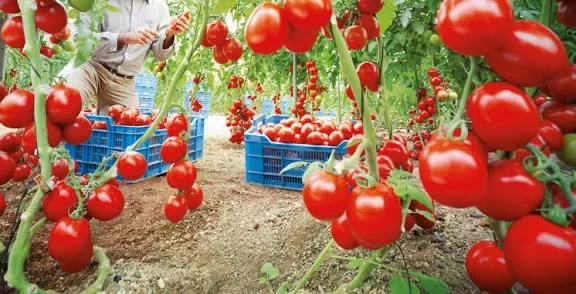Listen to the article
Moroccan fruit and vegetable producers are fighting back against what they describe as an orchestrated “disinformation campaign” by European media outlets targeting the country’s tomato exports. The Moroccan Association of Fruit and Vegetable Producers and Exporters (Apefel) has issued a strong statement defending the safety and quality of Moroccan tomatoes, dismissing allegations about sanitary compliance as scientifically unfounded.
Since 2023, Morocco has emerged as the European Union’s primary non-European tomato supplier, a position earned through consistent quality and stringent control measures. This commercial success, according to Apefel, has triggered what they characterize as systematic attempts to damage Morocco’s agricultural reputation through negative media coverage.
The association cites compelling evidence to support their position. Official European Union data shows that between 2020 and 2025, out of 5,502 notifications related to imported plant products, only 49—less than 1%—concerned Moroccan products. “These statistics clearly demonstrate the effectiveness of Morocco’s control system, which is managed by ONSSA (National Office for Food Safety) and renowned for its high standards and transparency,” Apefel stated.
The recent controversy ignited following a report by French consumer organization UFC-Que Choisir, which claimed to have detected “several residues” in Moroccan tomatoes. Addressing these claims, Apefel clarified that the mere detection of trace elements does not indicate exceedance of legally permitted thresholds.
“The minimal residues found are comparable to those present in European-grown produce and pose absolutely no health risk to consumers,” the organization emphasized. They further suggested that health concerns are being “weaponized for protectionist purposes” to limit Morocco’s access to European markets.
The dispute highlights growing tensions in the agricultural trade relationship between Morocco and European countries. Morocco’s geographical proximity to Europe, favorable climate for year-round growing, and relatively lower production costs have positioned it as a formidable competitor in the European fresh produce market.
Industry analysts note that European tomato producers, particularly those in Spain, France, and Italy, face increasing pressure from Moroccan imports, especially during winter months when domestic European production decreases. The Morocco-EU Agricultural Agreement, which has gradually liberalized trade, has further intensified this competition.
Agricultural economist Dr. Fatima Benali explains: “What we’re witnessing is a classic market disruption scenario. Moroccan producers have made significant investments in modernizing their operations, improving quality control, and meeting European standards. Their success is creating market share challenges for traditional European producers.”
The European tomato market represents a significant economic opportunity for Morocco, with the country exporting approximately 430,000 tons of tomatoes to the EU annually. The sector employs thousands of workers and has become a crucial component of Morocco’s agricultural development strategy, known as the Green Morocco Plan.
ONSSA, Morocco’s food safety authority, has reinforced its monitoring protocols in recent years, implementing rigorous testing procedures that align with European standards. The agency conducts regular inspections at production sites, packaging facilities, and exit points to ensure exported products meet international requirements.
Apefel concluded its statement by calling for “a debate based on transparency and cooperation” and reaffirmed its commitment to maintaining production standards that meet international requirements while adhering to principles of fair competition.
As this dispute unfolds, it underscores the complex interplay between food safety concerns, market competition, and trade politics in the increasingly interconnected global agricultural economy. For Moroccan producers, defending their reputation is not merely about current market access but about securing their long-term position as a trusted supplier in the competitive European fresh produce landscape.
Fact Checker
Verify the accuracy of this article using The Disinformation Commission analysis and real-time sources.




13 Comments
The statistics cited by the Moroccan association seem to present a strong case refuting the allegations against their tomato exports. Fact-based rebuttals are important in these situations.
Upholding food safety and quality standards is crucial for agricultural exporters seeking to maintain a competitive edge in global markets.
I’m curious to learn more about the specific disinformation tactics being used to target Moroccan tomatoes. Understanding the nature of these campaigns is important to develop effective counter-strategies.
Commodity markets can be highly competitive, so it’s not surprising to see producers push back against negative publicity. Fact-based responses are important to counter disinformation tactics.
Disinformation campaigns can have serious impacts on commodity markets. It’s good to see Moroccan producers taking a proactive stance to defend their reputation and standing.
The rise of Morocco as a major EU tomato supplier is an impressive achievement. It’s understandable they would want to vigorously defend their reputation against attempts to undermine their commercial success.
Rigorous quality control and food safety measures are key to maintaining trust in agricultural exports. Moroccan producers seem to have the right systems in place.
Interesting to see the Moroccan association cite official EU data to support their position. Transparency around compliance and quality assurance is crucial in agricultural trade.
The low non-compliance rate for Moroccan produce is a strong metric to highlight. It helps demonstrate the effectiveness of their food safety control system.
The rise of Morocco as a major EU tomato supplier is an interesting development. It will be important to monitor how they navigate any challenges to their market position going forward.
Maintaining consistent quality and safety standards is critical for agricultural exporters seeking to build long-term trust in their products.
It’s good to see Moroccan producers standing up against unfair media attacks on their tomato exports. Maintaining quality and safety standards is crucial for upholding their strong market position in the EU.
The data showing low non-compliance rates for Moroccan produce is a compelling rebuttal to the claims. Objective evidence is important to counter disinformation campaigns.